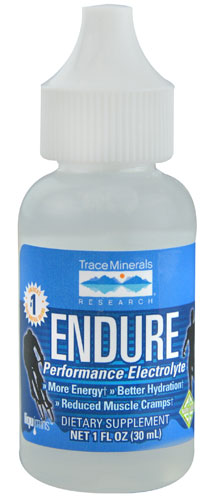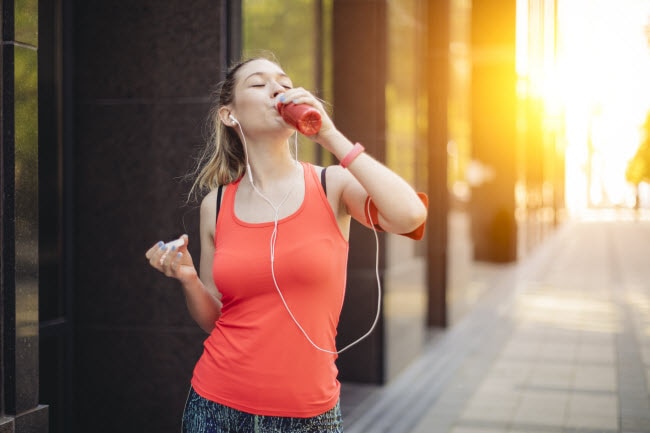If you’ve ever experienced blurred vision, dizziness, nausea, irregular heartbeat, numb extremities or sudden lethargy during or after intense workout or exposure to heat, you may be experiencing electrolyte imbalance.
Electrolytes are mineral compounds that produce an electrical charge the body needs to fuel its various systems. These minerals include potassium, chloride, sodium, magnesium, phosphate, calcium and bicarbonate. All of these are essential nutrients for the optimal function of cells, tissues, muscles, nerves, organs and blood plasma.
When your electrolyte count is too depleted, elevated or imbalanced, you can be at risk for any of the above issues—not to mention, other serious conditions, like coma, seizures or even cardiac arrest, if the electrolyte disorder persists.
Get your electrolytes in balance, and keep them in balance, with this must-have guide for all exercisers.
Electrolyte Imbalance Symptoms
What Happens When Your Electrolytes Are Too Low?
The depleted state of electrolyte levels is referred to as dehydration, which is most often caused by lack of fluid retention. When the body experiences sweating, diarrhea, fever, vomiting, or inadequate water and food consumption, this results in a purge of electrolytes.
When you excrete fluids due to a workout, for example, it’s critical to replace these fluids. If you don’t, your body won’t have the fluids it needs to carry out basic functions, which can force the body’s core temperature to increase at an accelerated pace.
The bigger problem: the regular cooling properties of sweat and oxygenated circulation are not able neutralize this increase, according to U.S. Institute of Medicine. In other words, if you don’t replenish with fluids that contain electrolytes, you’ll stress the heart, brain, kidneys and other vital organs.
What Happens When Your Electrolytes Are Too High?
An elevated state of electrolyte levels is referred to as edema, which is most often caused by too much fluid in the skin and tissues. When the body consumes more water than it actually requires, it gets an excessive influx of electrolytes, and the body cannot absorb of the nutritional benefits these minerals provide.
This “can dilute the concentration of electrolytes in your blood,” warns Georgie Fear, a board-certified sports dietician, and the overabundance of water, combined with the dilution of electrolytes, can result in a severe condition known as hyponatremia, characterized by reduced sodium levels in the bloodstream.
If this goes unaddressed, the hyponatremia could manifest as cerebral edema, a swelling of the brain cells that work to maintain a balance of fluid and electrolyte concentration within the “blood-brain barrier,” explains The Journal of Clinical Medicine.
As such, it’s dangerous to assume that just because you take in a copious amount of electrolytes, the body is able to process it all. In fact, too many electrolytes can be a very bad thing.
How Can You Promote a Healthy Balance of Electrolytes?
There are three main factors that contribute to a balanced electrolyte count—nutrition, hydration and supplementation. Since the body can’t manufacture electrolytes on its own, it must receive these minerals from food, water and fluids, or dietary supplements if needed.
Nutrition: Whether you’re plant-based or consume animal proteins, there are a number of healthy foods rich in electrolytes, including: whole milk, unsweetened soy milk, low-fat yogurt, squash, swiss cheese, spinach, dill pickles, coconut water, celery and lettuce.
Hydration: It’s important to avoid drinking excess fluids, but you still do need to hydrate—in particular, while you exercise or spend time in the heat. The American College of Sports Medicine suggest 11 cups of water on a daily basis—including water from food sources too—for women, and 16 cups for men. Consider drinking fluids that contain electrolytes as well, like coconut water and dairy milk.
Supplements: If you find it difficult to maintain electrolyte balance through nutrition and hydration alone, you can use supplements to get what you need. These come in drinkable, tablet or powdered forms, but not all brands are created equal. When choosing a supplement, avoid those with refined or artificial sweeteners and chemically enhanced ingredients. Some reputable options are Nuun Tablets, Skratch Labs Drink Mix, Tailwind Nutrition Endurance Fuel and LyteShow Liquid Concentrate. Remember to always consult with a nutritionist, doctor or dietitian before taking any electrolyte supplements.
Prevent Electrolyte Imbalance for Safe Exercise
If you start to exhibit symptoms that are consistent with an electrolyte imbalance, seek medical treatment as soon as possible. With immediate attention and intervention, this problem can be remedied, but it’s not an issue to minimize or disregard either.
Stay safe during workouts, especially in hot weather, by drinking the recommended daily fluid intake and noshing on foods that are filled with electrolytes. Don’t let electrolyte imbalance throw off your workout routine or worse, make you sick. Instead, use these tips to stay healthy through every workout.




